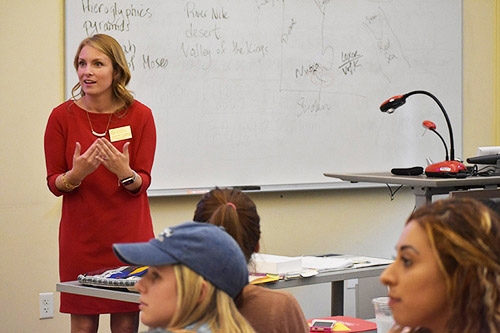
Tina Howlett knows the value of a good guest speaker and Courtney Cochran travels all over Arkansas and the United States talking to groups and meeting people.
Cochran, who is the Arkansas Teacher of the Year designated by the Arkansas Department of Education, had been on the road for seven hours the evening she talked to Howlett's University of Arkansas class, even though Cochran lives an hour away in Van Buren. Howlett, an assistant professor of Teaching English to Speakers of Other Languages, frequently has guest speakers in her class on Understanding Culture in the Classroom, even though she has worked in the field for more than 20 years. Previously, Howlett taught English to non-native speakers in Rogers for five years and spent another 15 years mentoring and coaching other ESL teachers and overseeing curriculum, compliance and consulting for the district. She also taught ESL in New Jersey and Pennsylvania.
So far in the semester, Howlett's students have heard from a U of A staff member who works with international students and described his upbringing as a Mormon in Utah and his experiences with the Peace Corps, a professor who described her experience of being homeless and seven Egyptian teachers who talked about their country.
"One goal of the course is for students to listen to various perspectives, especially from educators," Howlett said. "I model the 'guest speaker' as a classic teaching strategy. It is a way for my students to begin thinking about welcoming the voices and perspectives of others, parents and community members, into their future classrooms."
She has 29 juniors and seniors who are majoring in the childhood education and educational studies programs in the College of Education and Health Professions.
Cochran teaches Spanish at Van Buren High School but is taking the year off since being chosen last fall from among 30,000 Arkansas teachers as the Teacher of the Year. She earned a bachelor's degree in Spanish from the U of A and has been teaching for 12 years.
Cochran talked to the U of A students about culturally responsive teaching, which she said starts with a good understanding of their students' backgrounds. She suggested they get to know the communities from which their students come and make home visits, if possible. Visiting a family has been shown to increase school attendance by the children, she said. Communication needs to be personal, not a newsletter.
Culture shapes the way a person thinks and behaves, which makes understanding culture central to the learning process, Cochran said. She encouraged the U of A students who plan to be teachers to explore their own implicit biases and then share them with their students so that the students understand the teacher's cultural lens.
Also, a teacher needs to realize his or her behavior, even the way he or she stands, communicates expectations to students.
"Think about this for all students, not just the ones you like or truly think can achieve," Cochran said about communicating high expectations. "Your beliefs mean more than the school quality or teacher quality."
Teachers need to be sure that students maintain their culture in the classroom, Cochran said. The old philosophy of leaving a different language at the door can be stressful for a child who may feel a loss of identity, and it can cause problems for the child at home, too.
The teacher's goal should not be compliance or control but rather to give all students equal opportunities for learning, she said.
Cochran said a highlight of her travels with the other states' teachers of the year has been to learn how fortunate Arkansas teachers are. While much could be improved here, other states are dealing with severe budget shortages, low salary caps and teacher attendance problems, she said. She has worked with several organizations and regional advisory boards to be sure teachers are represented.
"It's the most incredible gift to have a seat at the table and be the voice of teachers," Cochran said.
Topics
Contacts
Heidi S. Wells, director of communications
College of Education and Health Professions
479-575-3138,